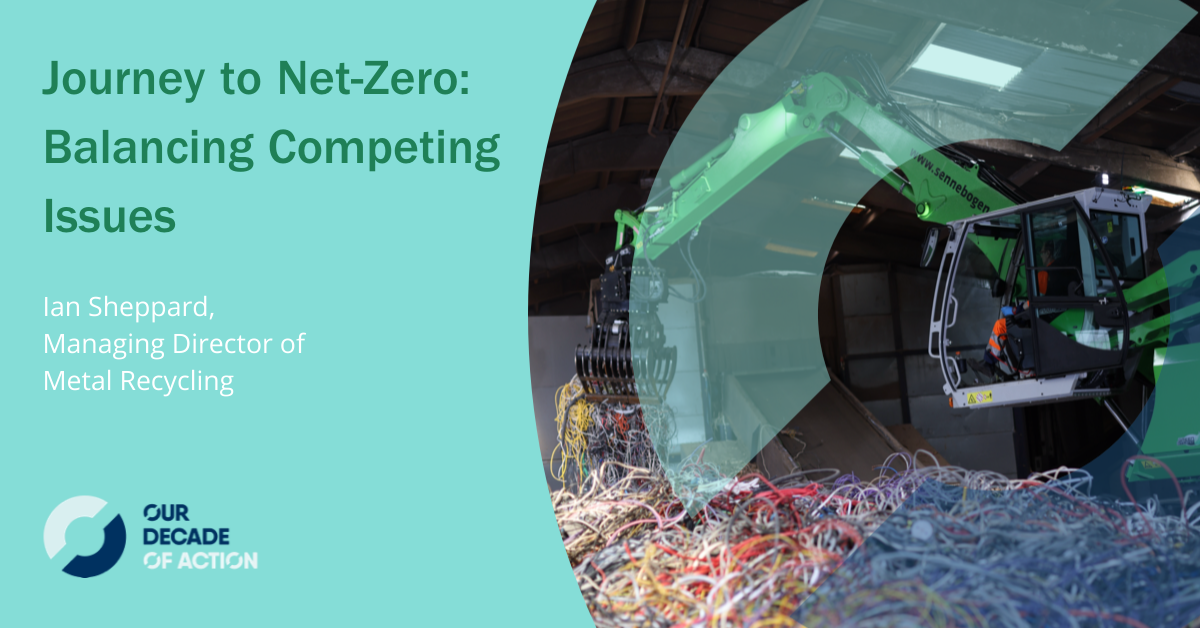CHOOSE
A DIFFERENT TERRITORY

Over the past 12 months, EMR has witnessed a rapid increase in the level of engagement from its customers, all of whom are grappling with how to reach net-zero. This is both welcome and essential, as every industry faces up to its responsibility in the fight against climate change.
These companies see EMR as a vital partner in their transition towards a more sustainable future - as a world-leading metal recycler, with ambitious decarbonising plans of our own.
In 2020 we announced that EMR would reach net-zero across its value chain by 2040. We started with Our Decade of Action, in which EMR will make big reductions in the carbon impact of its own operations over the ten years to 2030.
As the UK brings together governments and climate scientists for this month’s COP26 summit in Glasgow, it is worth exploring some of the challenges and opportunities that EMR and others face on this journey.
One challenge that all industries must contend with on the path to net-zero is the significant carbon emissions associated with the use of energy. EMR is no different.
Fortunately, the UK is seeing a steep rise in the production of renewable electricity which has allowed EMR to switch to 85 percent renewable power within just one year of the Our Decade of Action strategy. Our European business isn’t far behind and, as the US increases its investment in wind, solar and other zero carbon methods of power generation, EMR is set to make this important transition in every market that we operate by the end of the decade.
Not every challenge is as easy to solve.
As manufacturers seek to use more recycled materials, EMR is innovating to ensure we can provide the right sustainable products. This illustrates that we are already doing things, not just planning to.
Historically, recycled metal has often been used for basic, lower grade applications such as reinforcing bars in concrete construction. With a rise in consumer demand for sustainable options, our supply chain partners now require high grade green steel and green aluminium which can be used in sophisticated ways.
Car manufacturers, for example, want recycled metal to be used in the bodywork and chassis in order to lower the embodied carbon impact of their next generation electric vehicles. EMR is investing in creating the materials that can help them do it.
This takes investment and expertise, but it will also provide new profit opportunities for the net-zero recyclers of the future.
EMR has a good understanding of how to create these processes and is busy developing the technologies required.
Some challenges are more complicated.
EMR is a significant exporter of recycled metal, for example, and the shipping industry is yet to make any significant progress on decarbonising its operations. Heavy-goods vehicles are similarly substantially behind other road vehicles when it comes to the availability of low carbon alternatives.
For industries such as metal recycling, the path to net-zero requires a balanced approach of doing everything we can now, and being ready to adapt when innovation along the supply chain allows. This is the ethos of our 20 year sustainability plan.
So, while many obstacles to net-zero remain, EMR is busy getting on with the job of decarbonising our operations wherever we can.
And, as our customers and partners look for a sustainable partner to meet their own net-zero requirements, it is becoming clear that the challenge of reaching net-zero is going to mean industries collaborating in new and exciting ways.
COP26 is going to be a sobering reminder of what’s at stake if we don’t take dramatic climate action soon. The experience of EMR and its partners shows that making those changes early and together presents an opportunity to safeguard our future as a business and a planet.